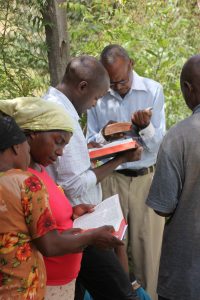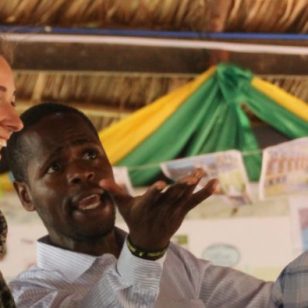By Andrew Walker on September 23, 2012, in The Christadelphian.
WHEN the Lord Jesus first sent out the apostles he gave them a dual mission: they were to preach, and they were to heal the sick. This they did, and after Jesus’ ascension they continued in the same vein.
We too find ourselves with two similar callings of preaching and welfare. In Galatians 6 for instance, the words in verse 6, “Let him that is taught in the word communicate unto him that teacheth in all good things”, are followed four verses later by, “As we have therefore opportunity, let us do good unto all men, especially unto them who are of the household of faith” (verse 10). In a sense any activity, public or private, impacts on these two responsibilities. To some measure, anything we do will benefit or harm those we meet, and will at the same time cause them to be more (or less) favourably disposed towards the Gospel message. The Christadelphian Bible Mission in the UK is above all a preaching organisation – the majority of its funding and its work is spent in endeavours to spread the Gospel and to support the spiritual growth of those who have responded. At the same time it reflects our duty of care in several ways – through Project Aid, through individual acts of kindness, the use of the Welfare Fund, and through a cooperative relationship with the Christadelphian Meal-a-Day Fund and other Christadelphian organisations.
Recently, there has been an increasing desire in our community to provide for the physical needs of not only our brothers and sisters, but of the world at large. This perhaps arises from a general awareness of the needs of those who lack the basic necessities of life – food, fresh water and medicine – and also by a recognition that if the teaching of the Gospel is to mean anything at all, its message must be reflected in the lives of those teaching it. It has also become increasingly clear that balance is necessary. On one hand, to preach the Gospel to a starving man without sharing our food with him would demonstrate that we had not understood the message we were teaching. On the other hand, experience has taught that to place an undue emphasis on physical welfare can create many other difficulties, as well as confusing those we are teaching as to what the Gospel is about.
This article is an attempt to explore these issues and to draw some conclusions that may, in God grace, help achieve a healthy balance.
Some scriptural considerations
The nation of Israel: The Almighty God felt the pain of his people in Egypt and suffered with them (Isaiah 63:9). He brought His people out of Egypt in order to save them from their slavery and to bring them into the land that He had promised. We can however learn something of His priorities when we reflect that in some ways – humanly speaking at least – their life in the wilderness was no better than in Egypt.
“And he humbled you and allowed you to hunger and fed you with manna, which you did not know nor did your fathers know, that he might make you know that man does not live by bread alone but man lives by every word that comes from the mouth of the Lord (Deuteronomy 8:3).
As one speaker memorably put it: “When God sent Moses into Egypt, it was to bring the people out, not to start a relief fund”. God’s ultimate aim was not their comfort, but their salvation.
In the time of Elijah, God brought three years of famine to the people of Israel in order that their hearts might be turned back to Him (1 Kings 18:37), and in later times afflicted them with a series of catastrophes – such as those listed in Amos 4 – with the same aim.
The lesson from all this is that although God is desperately concerned for the well-being of His people, the underlying aim is their salvation – and He is willing to deprive them physically and materially in order to further that aim.
Jesus’ ministry: Like his Father, Jesus was moved by the needs of those around him.
“And Jesus went throughout all the cities and villages, teaching in their synagogues and proclaiming the Gospel of the kingdom and healing every disease and every affliction. When he saw the crowds, he had compassion for them, because they were harassed and helpless, like sheep without a shepherd.” (Matthew 9:35,36)
Again, however, Jesus’ real aim was their salvation. Jesus said: “I came that they may have life and have it abundantly” (John 10: 10). This priority is reflected consistently in the Gospel of John where it is clear that all the Jesus’s signs conveyed a spiritual message which was intended to bring men and women to the Gospel.
The Acts of the Apostles: Throughout the Acts, Luke records miracles of healing that were performed by the apostles – from “many wonders and signs … done through the apostles” in Jerusalem (Acts 2:43) to those on Malta who had diseases, who “also came and were cured” through the hand of Paul (28:9).
What is noticeable, however, is that the recorded miracles occur when the apostles first visit a place or region, and not thereafter. It would seem clear that on each occasion their purpose was to attract the attention of a new audience to the fact that Jesus had risen from the dead.
“… let it be known to all of you and to all the people of Israel that by the name of Jesus Christ of Nazareth, whom you crucified, whom God raised from the dead – by him this man is standing before you well.” (4:10).
So once again the conclusion is that the primary aim is the teaching of the Gospel, especially to those who are of the household of faith. The parable of the Good Samaritan powerfully demonstrates the care that the Jesus expects us to have for those who are our “neighbours”. We are not expected to solve the world’s problems – the Lord will do that – but we are expected to do what we can to help those whom we meet, irrespective of their nationality or faith. But we have an even greater responsibility to our brothers and sisters. The words of God through the Apostle Paul recorded in Galatians 6:10,11 are clear: we are to “do good unto all men”, and the fact that the sentence continues ” … especially to those who are of the household of faith” confirms that “all” means – insofar as we are able- “all”. But a concern for our brothers and sisters, though not exclusive, should come first.
By the time that Paul, on his third missionary journey, wrote to the believers in Rome, his purpose was clear. “At present, however, I am going to Jerusalem bringing aid to the saints” (Romans 15:25). We do not know whether there was a widespread famine in Judaea or whether the believers were being persecuted for their faith – or both – but it was for them that Paul was concerned.
It is equally clear that he was not trying to benefit the saints disproportionately – merely trying to keep them alive. The brothers and sisters in Macedonia were themselves living in extreme poverty, yet Paul expected them to contribute so that there might be “equality” (2 Corinthians 8:2,14).
“By this we know love, that he laid down his life for us, and we ought to lay down our lives for the brothers. But if anyone has the world’s goods and sees his brother in need, yet closes his heart against him, how does God’s love abide in him?” (1 John 3: 16,17)
Publicity or privacy: There can be no distinction between a responsibility to preach and a desire to care for others. As Jesus said:
“Let your light so shine before men, that they may see your good works, and glorify your Father which is in heaven.” (Matthew 5: 16).
“By this shall all men know that ye are my disciples, if ye have love one to another.” (John 13:35).
So our acts of kindness can be an integral part of our preaching. On the other hand, Jesus said:
“Beware of practising your righteousness before other people in order to be seen by them, for then you will have no reward from your Father who is in heaven. Thus, when you give to the needy, sound no trumpet before you, as the hypocrites do in the synagogues and in the streets, that they may be praised by others. Truly, I say to you, they have received their reward.” (Matthew 6:1, 2).
At first glance this verse seems at odds with the Lord’s earlier words. However, it is worth remembering that the words in Matthew 6 were spoken of hypocrites whose deeds were carried out “to be seen of men” – the significant point is surely in that last phrase. Good deeds should stem from a caring heart, not from a desire for publicity. Our motive should be the compassion that the Lord Jesus showed, and we should be willing to do what good we can, irrespective of whether others will see what we do. Then, if it should happen that others see our good works, it should be our Father in heaven who will be glorified, not us as individuals, not the CBM, not even the Christadelphian community.
It is significant perhaps that the expression “good works” used by the Lord Jesus seems to refer not only to specific charitable acts, in the way we might use it today, but to the whole way of life of a believer. The point is illustrated by the Apostle Paul writing to Titus: “Show yourself in all respects to be a model of good works, and in your teaching show integrity, dignity, and sound speech that cannot be condemned, so that an opponent may be put to shame, having nothing evil to say about us” (Titus 2:7, 8).
Practical considerations
There are many examples of projects, such as those funded by the Christadelphian Meal-a-Day Fund, in which providing for the needs of a community have been a powerful witness to the truth of the Gospel. In many places in Africa there are water pumps and water tanks which bear the name “Christadelphian” in one form or another, and which benefit all in the village. They attest to the simple concern of brothers and sisters that we should do what we can to help those whose needs are so much greater than our own. Elsewhere there are orphanages which have similarly provided for the needs of children who would otherwise live without the loving care of a parent.
To these examples can be added many who through the CBM Welfare Fund have benefited from the kindness of their brothers and sisters and those who would have lived (or died) without food through a time of famine; who would have died from a curable illness; who would have found themselves homeless because of the cruelty and unkindness of individuals or governments.
These examples provide a powerful testimony of the love of Christ as seen in the kindness of those who have learned the truth of the gospel – and when those who have received help through these various means are moved in turn to share their benefit with their neighbours, they too witness to the reality of the Gospel.
But…
If the following paragraphs concentrate on problems that can arise as a result of welfare assistance, that is in no way intended to undermine what has already been said. We have an obligation to help our brothers and sisters and our neighbours. The fact that welfare, given without thought, can create problems, should cause us not to be ungenerous but to exercise our minds as well as our hearts.
There may be envy between brothers and sisters:
“Strive for peace with everyone, and for the holiness without which no one will see the Lord. See to it that no one fails to obtain the grace of God; that no ‘root of bitterness’ springs up and causes trouble and by it many become defiled” (Hebrews 12:14,15).
Very minor incidents can cause problems. Something that might seem trivial – giving a small empty water bottle to one poor sister rather than her friend; visiting the home of one family rather than another – can cause lasting problems. What might seem on the surface to be simply kind deeds can create tensions between brothers and sisters. Ever since “a complaint by the Hellenists arose against the Hebrews because their widows were being neglected in the daily distribution” (Acts 6: 1), this has been a real as well as a potential problem.
People may be attracted to the Gospel for the wrong reasons: “For the love of money is a root of all kinds of evils. It is through this craving that some have wandered away from the faith and pierced themselves with many pangs” (1 Timothy 6:10).
While the Lord Jesus was willing to feed those who sought him only “because you ate your fill of the loaves”, he did so primarily to teach them that they should “not labour for the food that perishes, but for the food that endures to eternal life, which the Son of Man will give to you” (John 6:26,27).
The real aim was not to satisfy their hunger but to bring them to the Gospel, and the fact that he did not routinely provide food to those who needed it should remind us of the danger that in our day too, people may be attracted by physical rather than spiritual food. In one European country in which the CBM is active, there was once a period of time in which those attending Gospel talks were “compensated for their loss of earnings”. Within a few years there were some sixty baptisms, and what seemed to be a healthy community began to appear. In one place the CBM provided money to rent a room and to purchase some basic furniture so that meetings could be held. Other welfare needs were provided for, including help for a sister who asked for assistance with the cost of medical expenses following a car accident. Sadly, it emerged that the ecclesia did not exist as portrayed and that the sister had doctored an old x-ray in order to support her claim. As these and other sources of money dried up, so interest in the Gospel waned, and there are now only a small handful of brothers and sisters in the country.
Such examples are few and far between, but similar stories could be told by many brothers and sisters who have been active in CBM work: an area in Africa, desperately short of food, which found a surge of men and women wanting to be baptised just as money was about to be sent to provide food; another area in which, once food had been given, there was immediately a similar flood of interest; a
third area in which unscrupulous men were baptized, joined an ecclesia, and proceeded to dominate its arrangements, intimidate its members, and to use regular funds sent from the UK for themselves rather than for the ecclesia.
All these situations were quickly identified and dealt with, but they illustrate the evils which can be rooted in a love of money. Such concerns should not cause us to be mean or unwilling to help, but they should make us always aware of the possible dangers that money can bring.
The dangers have been eloquently expressed elsewhere:
“If those to whom the Gospel is preached begin to receive material things that come with the Gospel, they may become more interested in those things than in the Gospel itself. When people come into the Christian faith for the material possessions they get, something goes terribly wrong in the spread of the Gospel. That might be the single most important reason why the dependency problem so often cripples the Christian movement and why it is so urgent that it be avoided or dealt with where it exists.” (World Mission Associates, Australia).
Even what may seem to be straightforward issues can conceal knotty problems. For example, in a country where no brother or sister is able to translate for a group of visitors it may be necessary to pay a commercial translator. When after a few years the translator becomes convinced of the truth of the Gospel and wishes to be baptised, he has to face up to the fact that since he would be expected to attend Bible Schools anyway, he will lose the source of income that he used to receive. The fact is that money and the Gospel are uncomfortable bedfellows.
Conclusions
From the scriptural and practical examples that have been considered, several conclusions emerge. Scripture teaches us that some things are more important than others – our priorities should be (in this order):
- To preach the Gospel.
- To care for our brothers and sisters.
- Insofar as we are able, to care for all men.
There is a connection between these things, of course. We cannot preach to those for whom we do not care, and if we truly love our neighbour the greatest gift we can give is the message of salvation. Whilst bearing in mind the ultimate priority, we should try to achieve a balance.
Acts of kindness should be motivated only by a caring heart and mind: Our motives are important. Good works should not spring from a desire to promote ourselves or our community; the primary motive should be a simple love for those in need – otherwise we may become like the Pharisees, who gave alms so that others would see their good works. If others, seeing our genuine loving care,
are drawn to ask “Why are they doing that?” we can then respond.
Welfare involves the use of both our minds and our hearts: in dealing with welfare matters we should endeavour to avoid the pitfalls that can otherwise occur:
- We should not provide benefits for our brothers and sisters that would be beyond the reach of their neighbours.
- Welfare provided to individual brothers and sisters should not benefit them above other brothers and sisters, but should simply try to help them through times of difficulty and to restore them to the situation in which they previously lived.
- This applies both at an individual level and more widely. One ecclesia should not benefit above another, nor one country above another. Benefit should be shared with the aim of providing the “equality” of which Paul wrote to Corinth.
- It is good to do what we can to improve the lot of whole communities by, for instance, providing clean water. It is also of course, good to do what we can to spread the message of the Gospel. We should not, however, create or even hint at a link between these things – “Listen to our talks and we’ll provide a water pump”, or “We’ve built an orphanage, so (unspoken – if you want it to continue) you’d better respond to the Gospel”.
- Whilst helping whole communities is something that CBM would encourage, we should be very wary about providing welfare to individuals who have not shown in baptism a commitment to the gospel and should always try to avoid any situation in which men and women are drawn to the gospel by the promise of material gain.
In terms of those with whom we work: the CBM has benefited greatly from its cooperation with many other Christadelphian organisations. In working with them we should hear the above principles in mind, and should try where relevant to encourage them to follow the same guidelines.
“The aim of our charge is love that issues from a pure heart and a good conscience and a sincere faith.” (1 Timothy 1:5).
– Andrew Walker, The Christadelphian (September 2012)







